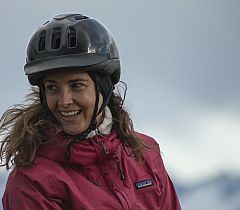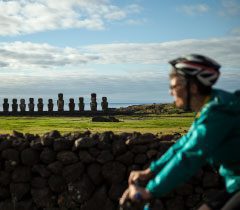Explora: The story of a company whose philosophy led the way and revolutionized the world of travel.
Explora was born in Patagonia 30 years ago with the intention of sharing what no other travel company was offering: the remote, unexplored and local underbelly of Chile. This, Explora believed, held the key to really appreciating the beauty of the country and would ultimately set a new benchmark in travel and tourist experiences.
This philosophy of Explora has stood the test of time and grown to set the standard for conservation, sustainability and a new way of guiding travelers.
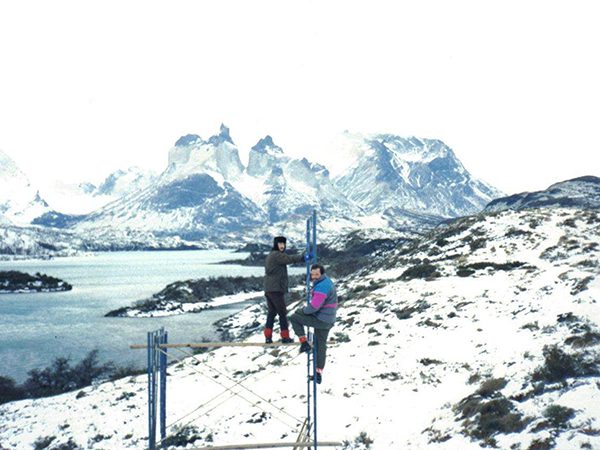
Thirty years ago, few imagined that a hotel located in a little-known remote area with an extreme climate could prosper. Yet it was precisely those qualities that drew adventure travelers from all over the world to the first Explora lodge in Patagonia.
Explora was created in 1993 by a group of friends. Their dream was to share with the world the beauty of the natural wonders and landscapes; alongside the local cultures and traditions that they themselves had discovered on their own adventures through the unexplored corners of Chile.
A wild bet
Pedro Ibáñez Santa María founded Explora out of a deep love for travel and nature. His wild idea was to bring the beauty of Chilean landscapes and their local culture to a broader community with the necessary amenities to reward in depth explorations whilst preserving their untouched and pristine nature.
The name Explora and the concept behind it was developed by Ibáñez and his group of friends, including Germán del Sol, Luis Osvaldo de Castro, Alejandro Tardel, Carlos Aldunate and Jorge Schmidt.
“It didn’t make sense to us that people came to Chile to do the same kind of tourism you find in the Caribbean; or in the great historical centers of the world,” Ibáñez has said in an interview with ED magazine. “There are not many cathedrals in Chile, nor monuments or relics. We needed to look to what was uniquely Chilean and share that: our traditions, culture and character.”
In 1990, Explora won a tender offered by the National Forestry Corporation to start operations in the Torres del Paine National Park, in the Magallanes and Chilean Antarctic Region. This process led to the design and creation of the first Explora lodge, spearheaded by the Chilean architects and National Architecture Award winners Germán del Sol and José Cruz Ovalle.
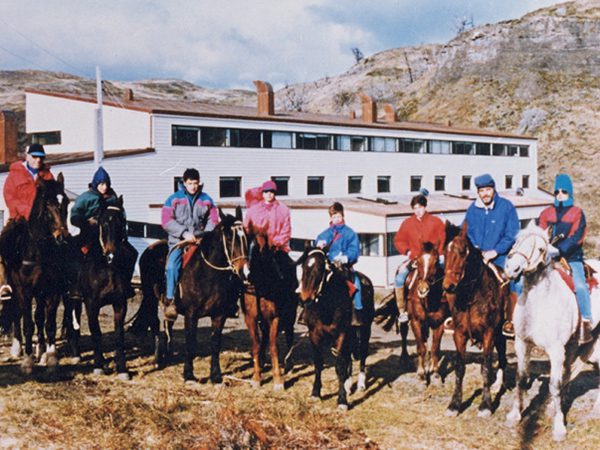
“The Torres del Paine project was one of my first projects of this magnitude in such a remote and wild landscape;” Cruz Ovalle explains. Before the construction of the lodge, the national park was closed most of the time. “The challenge, therefore, was to enable both the remoteness and the trappings of civilization to coexist harmoniously in the design,” Cruz Ovalle adds.
“Explora has an ethos and approach that allows you to learn about the culture of the natural environment that surrounds you,” explains Germán del Sol. “The hotel´s wooden construction is the same material, worked with the same techniques that local people use in their own Patagonian building projects. The colors are the same too. It´s a full immersion experience.”
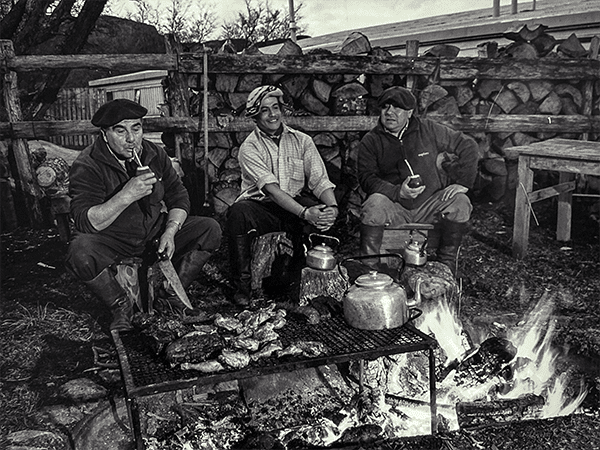
Implementing a new concept of travel
Over three decades, Explora´s guest activities – known as explorations – have operated with the same philosophy and take-away: for the traveler to nurture a deep connection with the natural landscape. Each step of the journey is just as important as the final destination. In recent years, the guides have also communicated Explora´s increasing emphasis on the importance of environmental protection.
“In these 30 years of history, we have developed the highest quality companions for exploration through our guide-school program,” explains Sebastián Correa, manager of Lands and Explorations at Explora. “They don´t walk in front, telling you what can and can´t do. Instead they walk beside you, openly sharing their knowledge.”
“Local characters such as muleteers and cattle herders make great guides,” adds Correa. “They are a wealth of history and life experiences which they communicate in an engaging and spontaneous way. This has been our business model ever since Pedro Ibáñez and the team conceived the Explora concept.”
In the same way the guides are an integral part of Explora, the employees developing the explorations and projects at each of the hotels work in a dynamic and multidisciplinary way.
“Setting up a new Explora hotel and its associated explorations is a really exciting proposition,” explains Correa. Beyond the commercial element, the most important thing is a profound and rich connection with the landscape. We contact geographers, paleontologists, experts in local birds and fauna, historians and archaeologists. This type of knowledge acquisition is very unusual for a company.”
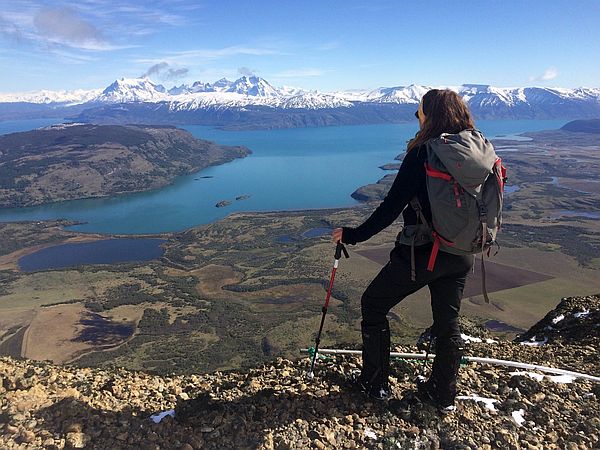
It is from this process of investigation of the unique qualities of the local landscape that Explora can offer near to 50 different types of exploration in each destination. Explora has always been recognized for this: taking its guests deeper into remote places where they create intimate connections with the land and ultimately want to protect it.
“Explora has a philosophy that lies in actively connecting its guests with the landscape at the reflective pace that walking speed allows,” explains Gonzalo Undurraga, the CEO of Explora. Bringing people together, taking care of the group, making them feel genuinely welcome, guiding them in their journey to becoming a protector of the land and witness its recovery as they fall in love with it: that´s what we are all about. To work at Explora, you must be a curious guide, a warm host and a passionate guardian.”
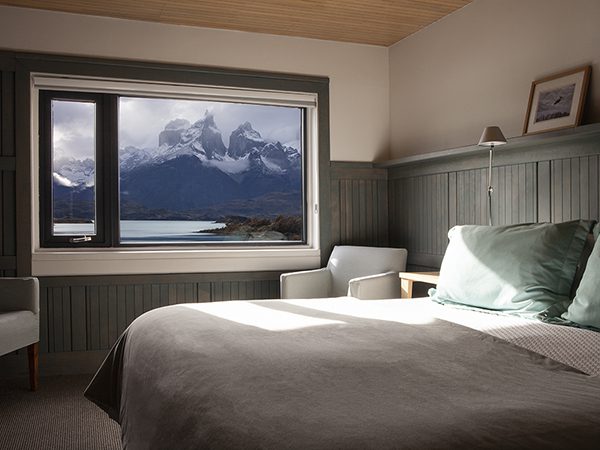
The Luxury of the Essential
An important decision in the design of the hotels or “base camps”, was the inclusion of large windows and the absence of a television or minibar in the room. In a break away from the paradigm of the classic hotels everything was designed for the traveler to make the decision to explore.
“We define luxury as the provision of the fundamental elements required for returning to a more natural state of living: the things you need to live remotely, in an adverse climate or in demanding weather conditions,” Pedro Ibáñez has said in an interview for the Chilean magazine, Revista Paula. We provide plenty of water, a good bed, natural light, food and simple interiors. The luxury of the essential is the opposite of the luxury of the accessory. In the traditional idea of luxury, things or spaces are sometimes rendered redundant by their abundance and are almost always pretentious. And, of course, we wanted to maintain that spirit of austerity, of living with little.”
In addition to the design ethos of the Explora lodges, the company since its inceptions 30 years ago has prioritized walking, horseback riding or kayaking not as outdoor activities, but as forms of transportation in themselves that allow greater connection with the environment when visiting the respective landscapes surrounding the hotels.
The horses at Explora have specifically been bred for their height and resilience. The result is a mixture of Chilean, English and Arabian horses. The animals are bred by Gaela Hourcq, the current head of Explora stables who has been working with horses throughout Patagonia and the Atacama for twenty years.
Today, these horses are part of an important conservation project that uses livestock to restore life to degraded soils. This initiative came about after Explora decided to prioritize conservation as a central part of its philosophy and purpose, resulting in the creation of two Explora Conservation Reserves, one in Torres del Paine and the other in Atacama.
“Conservation is a direct outcome of our activities and our philosophy,” says Romina Da Pieve, deputy manager of Explora Conservation Reserves. After three decades of operations, this has become the driving force and priority of the exploration company founded by Pedro Ibáñez.
